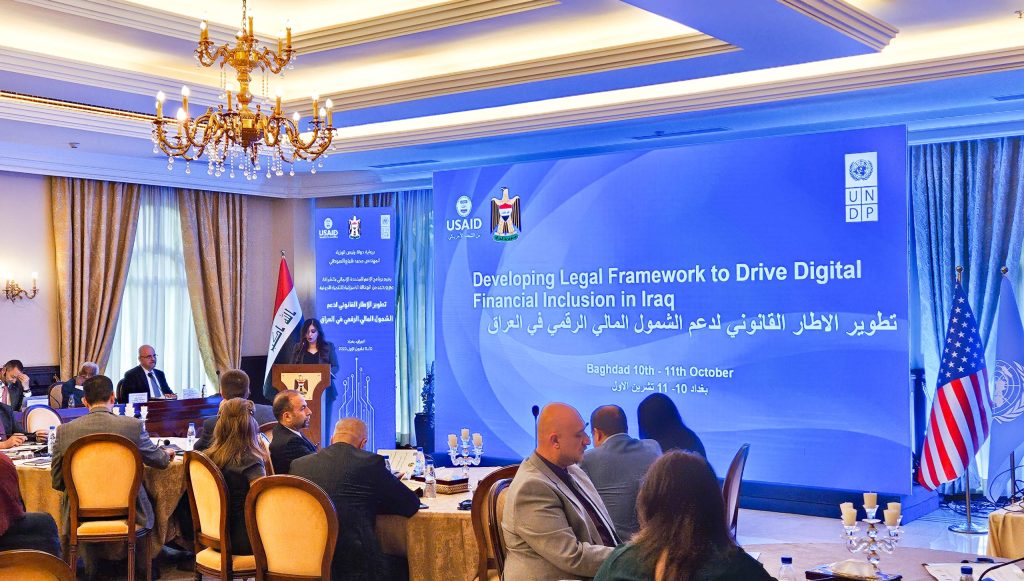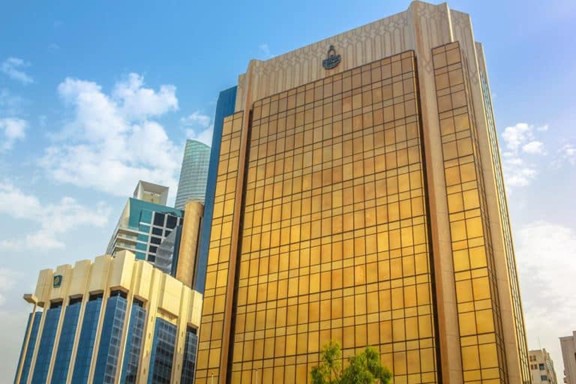December 3, 2024
Ali Al-Zuhairi, Project Coordinator
In a world increasingly reliant on digital finance, Iraq has taken a transformative step by issuing Digital Payments Regulation No. 2 of 2024. This landmark policy not only represents a regulatory advance but also signals a realignment of Iraq’s financial infrastructure with global standards. This move aims to reduce the country’s overreliance on cash, enhance financial inclusion and economic transparency, and herald a future of resilience and innovation in the Iraqi financial sector.
Beyond Compliance: Transforming Towards Better Financial Inclusion
The Central Bank of Iraq has set a clear direction: digital payments are now an essential part of Iraq’s economic future. Funded by the United States Agency for International Development (USAID) in Iraq and supported by the United Nations Development Programme (UNDP) in Iraq, this regulation serves as an incentive to ensure the availability of digital transactions, not only in urban business centers but also across various sectors, contributing to linking public and private financial environments. Iraq’s transition to digital payments will provide a range of economic benefits, including streamlined processes, improved data clarity, and enhanced financial security. “Digital payments have reached 7.6 trillion Iraqi dinars, up from 2.6 trillion Iraqi dinars in January 2023,” as previously announced by Mohammed Shia al-Sudani, Prime Minister of Iraq.
Currently, Iraq’s cash-based economy poses significant challenges to financial transactions and transparency. The new digital payment system is changing the status quo, encouraging businesses to adopt tools such as point-of-sale systems, e-wallets, and online portals. As Iraq embraces this development, the United Nations Development Programme (UNDP) in Iraq continues to support the government in developing a legal framework aligned with the Sustainable Development Goals and international best practices.
Ali Al-Alaq, Governor of the Central Bank of Iraq
Iraq now has a sophisticated infrastructure capable of accommodating electronic payment tools and financial services. It will soon transition to digital banking, where smartphones will manage various banking operations. This transformation will facilitate citizens’ financial access to services, reduce opportunities for corruption and fraud, and provide vital national-level data on the nature, content, oversight, and compliance of transactions through this comprehensive system.
The strategic role of the United Nations Development Programme Development in Laying the Groundwork
UNDP’s contribution goes beyond technical support to include a strategic partnership aimed at strengthening Iraq’s digital financial system. Working closely with the Central Bank of Iraq, UNDP has provided the technical expertise needed to formulate policies that enable the transition to a digital economy while ensuring inclusiveness and sustainability. This partnership highlights how collaborative and forward-looking strategies can contribute to sustainable structural change in emerging markets.
This regulation is more than just a technological leap forward; it is a qualitative shift toward economic resilience, inclusion, and transparency in Iraq. By modernizing the financial system, the project opens new horizons for every Iraqi to fully participate in the economy and contribute to a stable and innovative future.
USAID is proud to support Iraq’s journey toward digital finance, as part of our commitment to promoting sustainable development and economic opportunity. This regulation reflects Iraq’s determination to build an inclusive, resilient economy that is aligned with the needs of its people. We are honored to be part of this transformative chapter in Iraq’s financial history,” said Erin Moon-Marquis, Acting Mission Director for USAID/Iraq.
A Glimpse into the Future: Implications for Iraq’s Economy
The impact of this regulation goes beyond compliance:
Strengthening Financial Governance: Reducing reliance on cash reduces the risk of money laundering and corruption, creating a transparent process for transactions, and enhancing accountability across the public and private sectors.
Increasing Economic Resilience and Investment Potential: By modernizing its financial system, Iraq becomes a more attractive market for foreign investors and opens the door to collaboration with global fintech companies.
Supporting SMEs and Innovation Hubs: Cashless systems reduce operational barriers for startups and small businesses, enabling entrepreneurship and empowering Iraqi talent to thrive.
More than a Policy Shift: A Cultural Shift
The shift toward digital payments represents a profound cultural shift in Iraq, where cash transactions have long been the norm. Similar shifts in countries like India have demonstrated that this change is not just technical; it requires a shift in public behavior and trust. Iraq’s journey toward digital adoption will depend on a clear vision from its leaders and the concerted efforts of regulators, businesses, and consumers alike.
This regulation is a pivotal achievement in Iraq’s journey toward building a financially inclusive, transparent, and resilient economy. Thanks to the leadership of the Central Bank, technical advice from the United Nations Development Programme, and support from the United States Agency for International Development, Iraq is well-positioned to build a resilient digital economy. Moving forward requires a collective commitment from all stakeholders to drive adoption and overcome challenges.
If Iraq fully capitalizes on this opportunity, it could become a model for how thoughtful policies and collaboration can accelerate a country’s entry into the digital age and unleash tremendous potential for years to come.











